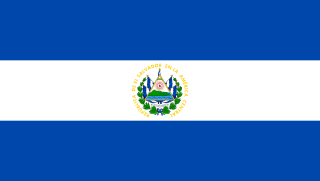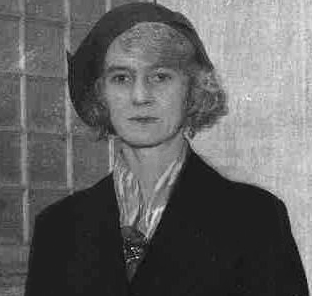
Sonsonate is a department of El Salvador in the western part of the country. The capital is Sonsonate.

Claudia Lars, born in Armenia, El Salvador on December 20, 1899 as Margarita del Carmen Brannon Vega, was a Salvadoran poet. She died in San Salvador in 1974. She was the daughter of Peter Patrick Brannon and Carmen Vega Zelayandía.

José Matías Delgado y de León was a Salvadoran priest and doctor known as El Padre de la Patria Salvadoreña.
The Museo de la Palabra y la Imagen is a museum located in San Salvador, El Salvador. It was founded in the late 1990s by the Venezuelan journalist Carlos Henríquez Consalvi as a museum dedicated to collecting and preserving memories of the Salvadoran civil war, incorporating memories across the political spectrum. The general enthusiasm of the public quickly prompted the MUPI to expand and it now includes a variety of exhibits that deal with various moments in the nation's past.

Salvadorans, also known as Salvadorians, are citizens of El Salvador, a country in Central America. Most Salvadorans live in El Salvador, although there is also a significant Salvadoran diaspora, particularly in the United States, with smaller communities in other countries around the world.

Vicente Alberto Masferrer Mónico, known as Alberto Masferrer, was a Salvadoran essayist, philosopher, fiction writer, and journalist, best known for the development of the philosophy of 'Vital Minimum' or 'Vitalismo' in Spanish. He was born in Alegría, Usulután formerly Tecape, Usulután in El Salvador on 24 July 1868. He did not receive a formal education, instead claiming to have been educated by "the university of life," but he did travel widely, having lived in several Central American countries, as well as in Chile, New York, and several European nations. During his public career at the Ministry of Foreign Affairs of El Salvador, he served as an ambassador of El Salvador in Argentina, Chile, Costa Rica, and Belgium, and served as a professor in Guatemala, El Salvador, Honduras, Costa Rica, Chile, and Argentina. Having served in the government of President Arturo Araujo, he was sent into exile in Honduras by the dictatorship of Maximiliano Hernández Martínez following the uprising of 1932 known as La Matanza, dying that same year on 8 September in the city of Tegucigalpa, Honduras. Masferrer was well respected throughout his life, having earned the praise of such major Salvadoran figures as Arturo Ambrogi, Miguel Ángel Espino, Claudia Lars, and Salarrué.

Afro Salvadorans are Salvadorans of Sub-Saharan African descent. They are the descendants of slaves brought to El Salvador via the Trans-atlantic slave trade during the colonial Spanish era.
Carlos Henríquez Consalvi, alias Santiago is a Venezuelan author, journalist, radio producer and museum director.

Latin American feminism is a collection of movements aimed at defining, establishing, and achieving equal political, economic, cultural, personal, and social rights for Latin American women. This includes seeking to establish equal opportunities for women in education and employment. People who practice feminism by advocating or supporting the rights and equality of women are feminists.

Elisa Hall de Asturias was a Guatemalan writer and intellectual. In the 1930s, she wrote a book Semilla de mostaza that became the source of controversy for nearly 70 years. Anti-feminist biases at the time that she wrote led to the conclusion that she could not have written the book, which had become a mainstay of Guatemala's literary heritage. In 2011 and 2012, new research into the controversy verified that she was the author of the work.

The Inter-American Commission of Women, abbreviated CIM, is an organization that falls within the Organization of American States. It was established in 1928 by the Sixth Pan-American Conference and is composed of one female representative from each Republic in the Union. In 1938, the CIM was made a permanent organization, with the goal of studying and addressing women's issues in the Americas.
Rosa Amelia Guzmán was a Salvadoran journalist, feminist and suffragette. Her 1950 speech to the Constituent Assembly was instrumental in women gaining, not just the right to vote, but the rights of citizenship on 14 September. She was one of the first four women elected to serve in the Legislative Assembly of El Salvador.

Alice Lardé de Venturino was a Salvadoran poet and writer. Internationally recognized for her lyric poems, Lardé also published scientific works. She has been recognized by the Legislative Assembly of El Salvador and the government of Chile, both of whom have renamed public streets and offices in her name.

Graciela Amaya de García was a Central American feminist and labor organizer. Born in El Salvador and trained as a teacher, she moved to Honduras at the age of twenty. Joining the socialist movement, she became a party operative, founding trade unions to resist the labor practices of the industrialists operating in the country. She formed the first feminist organization of Honduras, the Society of Feminist Culture, in 1923 and organized night schools for working women to teach them about their rights. Expelled from Honduras for leading demonstrations against the government in 1944, she fled home to El Salvador but remained only a few months because a coup d'etat brought in a dictatorship. Relocating to Guatemala, García continued with her activities organizing labor and educating working-class people, until she was expelled by the president in 1946. Moving to Mexico, she worked for the Secretariate of Education and wrote articles in support of leftist politics and women.

Irma Segunda Amaya Echeverría is a Salvadoran feminist, human rights activist, former guerrilla fighter, and politician. She was a member of the Legislative Assembly of El Salvador and the first Salvadoran female President of the Central American Parliament (PARLACEN) for the term 2018–2019.
Sara García Gross is a Salvadoran activist, psychologist, feminist, and human rights defender. She is the coordinator of political advocacy for the Citizen Group for the Decriminalization of Therapeutic, Ethical, and Eugenic Abortion, founded in 2009. She is also a member of the Salvadoran Network of Women Human Rights Defenders. In 2019, she was presented with France's Simone de Beauvoir Prize for her work promoting abortion rights.
Salvadoran nationality law is regulated by the Constitution; the Legislative Decree 2772, commonly known as the 1933 Law on Migration, and its revisions; and the 1986 Law on Foreigner Issues. These laws determine who is, or is eligible to be, a citizen of El Salvador. The legal means to acquire nationality and formal membership in a nation differ from the relationship of rights and obligations between a national and the nation, known as citizenship. Salvadoran nationality is typically obtained either on the principle of jus soli, i.e. by birth in El Salvador; or under the rules of jus sanguinis, i.e. by birth abroad to a parent with Salvadoran nationality. It can also be granted to a citizen of any Central American state, or a permanent resident who has lived in the country for a given period of time through naturalization.

From January 1822 to July 1823, the Captaincy General of Guatemala, a former Spanish colony, was controlled by the First Mexican Empire, and briefly, the Supreme Executive Power—the provisional government that succeeded Mexican imperial rule. The captaincy general consisted of the provinces of Chiapas, Costa Rica, El Salvador, Guatemala, Honduras, and Nicaragua—the six southernmost provinces of the Mexican Empire. The incorporation of Central America brought Mexico to the height of its territorial extent.

Ana Margarita Gasteazoro (1950–1993) was a Salvadoran political activist and political prisoner. Born to a wealthy family, she was a clandestine operative with the Farabundo Martí Popular Liberation Forces during the Salvadoran Civil War. In 1981, she was disappeared by the Salvadoran National Guard and spent two years in prison.















